That is a devious, ruthless backstab. Issues of morality aside, I hope the Mas' confidence in their own long-term abilities is not misplaced. The victor gets to write the history, this is true, but if Xibei San Ma's betrayal merely ends up speeding up Japan's conquest of China (followed by a quick Japanese DOW of XSM), then history will not be kind to the Ma's...
LIFE in the Trenches: 1936 Xibei San Ma
- Thread starter eqqman
- Start date
-
We have updated our Community Code of Conduct. Please read through the new rules for the forum that are an integral part of Paradox Interactive’s User Agreement.
You are using an out of date browser. It may not display this or other websites correctly.
You should upgrade or use an alternative browser.
You should upgrade or use an alternative browser.
...I hope the Mas' confidence in their own long-term abilities is not misplaced.
They may not be able to win, but they can keep from losing. Japan can't defeat the Ma Clique without getting to Golmud, and the bad infrastructure there means that they have no choice but to pass through Darlag province to do it. So with a nice 5-division stack on Darlag and the province to the left of it, I can hold out for quite a while. The main worry would be air power but I could get AA brigades in place by then. The defensive line could also be flanked by a Japanese invasion of Yunnan, but I've never seen them do it unless Yunnan is foolish enough to get itself into the Allies.
Excellent stuff, a nice presentation and system you've got going. The Ma are pretty gutsy, I hope it doesn't backfire in their face after such early successes!
Excellent stuff, a nice presentation and system you've got going.
Welcome, and thanks!
The Ma are pretty gutsy, I hope it doesn't backfire in their face after such early successes!
That is ambitious of the Ma's!
If things get really bad, the Mas can always hole up in Golmud until the Yankees arrive, but I'm expecting it won't come to that.
...but I'm expecting it won't come to that.
I never doubt the Zog effect.
I never doubt the Zog effect.
Hehehe... the Mas will have a harder time than Zog though since you can't really make the most (read:exploit) of the War Goal system without being in a faction. Currently, I'm faction-less.
Last edited:
Hello, Im finally caught up with in this AAR, I've read your Albanian and Guangxi clique AARs and found them very entertaining and some great tips and strategy from them. I always believed the minor nations were intended to be just conquerable nations for the big guys(majors). But watching that minors can also be fun to play has made me play a few as well. Good job and good writing. Your AARs are on my watchout for list. Keep up the good work.
Hello, I'm finally caught up with in this AAR, I've read your Albanian and Guangxi clique AARs and found them very entertaining and some great tips and strategy from them. I always believed the minor nations were intended to be just conquerable nations for the big guys(majors). But watching that minors can also be fun to play has made me play a few as well. Good job and good writing. Your AARs are on my watchout for list. Keep up the good work.
Welcome, and thanks!
Minors can be great fun to play for many reasons, especially since you have to learn to make do with less. Even just accomplishing historical goals can be a challenge.
Welcome, and thanks!
Minors can be great fun to play for many reasons, especially since you have to learn to make do with less. Even just accomplishing historical goals can be a challenge.
No problem, Yes your very true. As a minor also if you dont *manipulate* the majors in most cases you just fighting a war of survival. Have you tried allying wit the Comintern in any games? I dont know if its built into their game mechanics or what, but i played a game with Singkiang and allying with the SU. Used them to take afghanistan then immediatly invade Poland in a preemptive attack on Germany. Then added a wargoal on Germany for conquer..in the hopes of getting some Ic from them hehe. but the Germans held the border till japan and italy jumped over to the axis..then i kinda lost interest. wanted to get them before all that then all hades broke loose. real early. lol. but while i was allied with SU i could get alot of resources for free...no money at all for them. which that part of was cool.
Have you tried allying wit the Comintern in any games?
Yes, as both Canada and Sinkiang, and in each case the game crashed as soon as fighting started in Europe. There appear to be some broken War Goals for the USSR just as Japan's 'Victory over the US' one crashes the game. So far WGs seem to be the only thing that crash the game for me.
[size=+1]
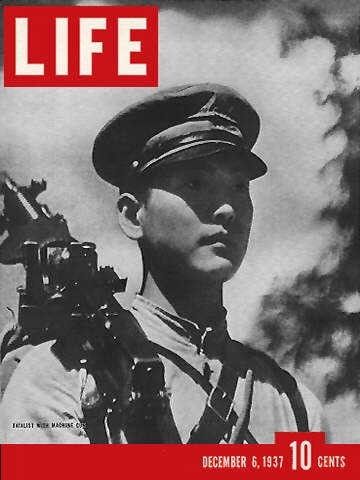
[size=-2]December issue discussing Japanese aggression[/size]
1 October: Ma Bufang’s cavalry and I reached Chungking today. They are going to continue on to the south, but I will stay here for a while. His main role is to basically show the flag and secure the governmental and communication centers all the way down to Canton, but not to do any real fighting. Infantry is already on a train down here and will hold the line in case of a counterattack. But Bufang is pressed for time and will not even wait for them to arrive before continuing south. He will leave tomorrow and I will be here alone for a spell with just the few dozen soldiers that are left stationed at the city hall. It will be a potentially dangerous time, but there is no immediate sign of a response from Chiang anywhere on the horizon. I’ll be very sorry to see Bufang go; he and some of the other members of his staff turned out to be quite formidable bridge players... I consider myself lucky there was never any money going on the table.
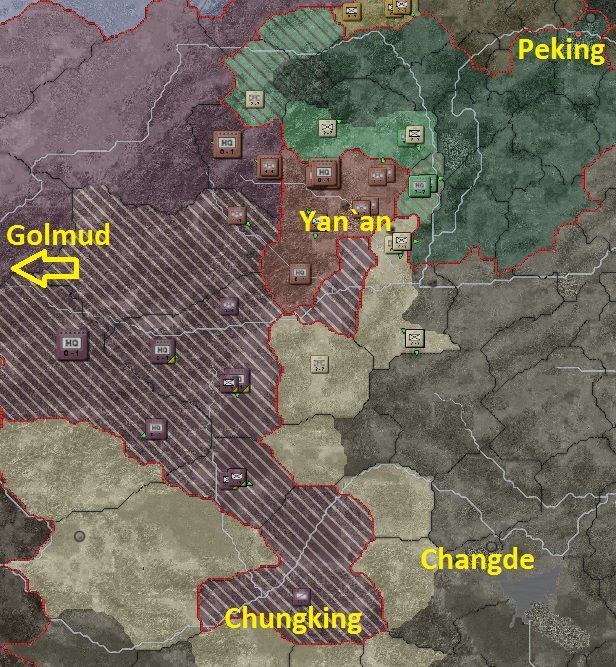
[size=-2]Ma Clique troops reach Chungking,
the most important city in the southwest[/size]
Chungking is one of China’s oldest cities, and given how long Chinese civilization has been continuously extant, that says quite a bit. The city sits on the Yangtze River, which has its own origins high up in the Tibetan plateau, and was at the very edge of Chinese influence to the west for much of antiquity. It was mainly independent until conquered by the state of Qin at about the time that Alexander the Great was building his empire in the Middle East[size=-2][1][/size]. Qin would end up being the first imperial dynasty to unify all of China and is also the source of the country’s name in English (Qin > Chin > China). Of course, the area occupied by Qin is far less than the lands claimed by China today, so I’m not quite clear as to what Chinese historians consider `all` of China when they refer to the Qin Empire. I assume they may mean being masters of both the Yellow River waterway in the north and the Yangtze River in the south... the Qin dynasty is predated by both the Shang dynasty and the even earlier Xia dynasty (so early it is ahead of the written record), but these kingdoms only flourished along the Yellow River I believe.
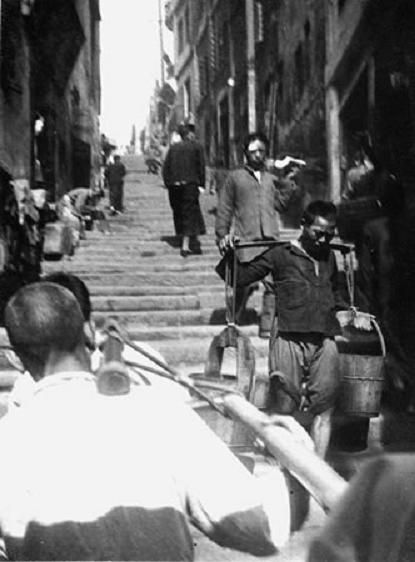
[size=-2]Peasants climb the streets of Chungking[/size]
This city is right up in the hills with a mountain range to be found at all of the cardinal directions. Although I haven’t been there myself, I would suspect that Chungking is even hillier than San Francisco. There are almost no motorcars anywhere to be seen, and many of the streets are actually just staircases, which mean this city has fewer bicycles than any other major urban area I’ve been to in China. Little plumbing is in existence, so most of the peasants have to keep hauling water up from the river and up the hills to the central part of the town. The river of course is also used as a sewer, so in between that and the pigs that are allowed to run free in the streets, it’s best to stay indoors when the heat of the day amplifies all the various smells. This city is also one of the foggiest I’ve ever been in, which draws another comparison to San Francisco. One of the locals told me it isn’t uncommon to have a whole month go by where there is fog every day. But getting back to the Yangtze, it is actually navigable all the way down to the coast from here, so if Shanghai at the river’s mouth can be kept out of Japanese hands, supplying the city directly should be a possibility in the long-term.
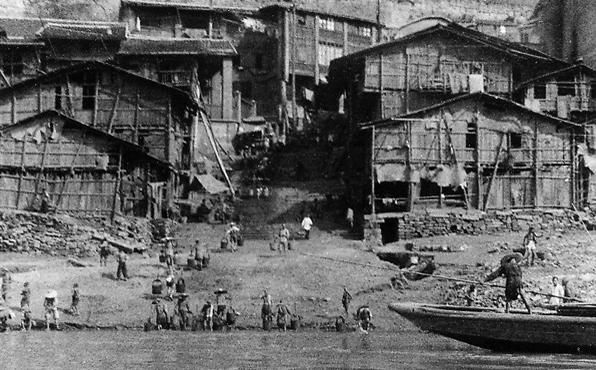
[size=-2]Peasants collect water from the Yangtze River.
I’ll take mine well-boiled, please![/size]
3 October: I’ve been spending my days at the city hall and my nights at a cheap flophouse nearby that Bufang’s men confiscated for a barracks. I feel fairly bad for the owners, and if I can work up the nerve I may try to speak to one of the Mas about getting them compensated. Most of my spare time consists of staying near the wireless to get news of what is happening. Once in a while we find that we can even get BBC broadcasts out of Hong Kong! Anyway, today there were definitely ‘news-worthy’ reports coming from the wireless. Japan finally took Peking, which made the military governor of Shaanxi province decide to surrender all forces under his control to the Japanese. So the Mas’ betrayal has certainly had an impact. Chiang has now sent enough men back by train to the west that his forward campaign in Manchuria has not only been beaten back, but the Japanese have pushed forward onto Han Chinese soil. So far there is still no sign of Chiang’s troops opposing the Ma Clique’s moves, but these areas are very far away from the Japanese front, and Chiang also now has a renewed war with the Communists to deal with over near Yan`an.
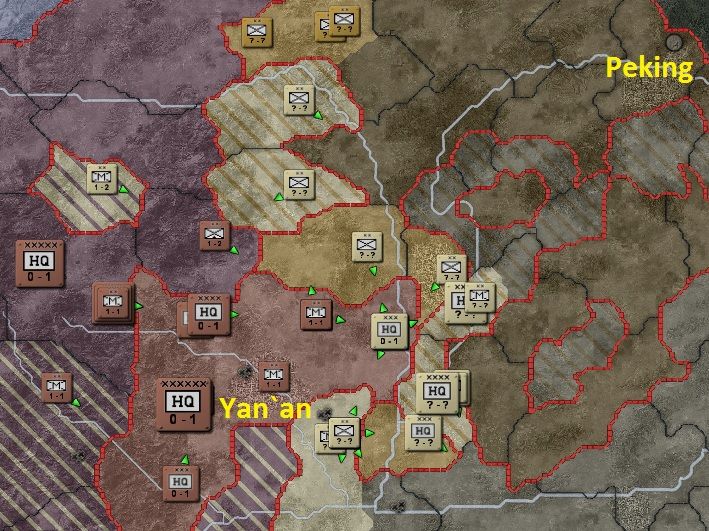
[size=-2]Peking has fallen; Chiang’s troops are now divided between
facing Japan, the Communists, and the Mas[/size]
It would also appear that the Japanese are wasting little time on the political front. They’ve announced that part of the areas of Shaanxi province they have occupied are being granted to the new state of Mengkukuo, which they have just `liberated` from the Han Chinese. This region was in fact carved off of Mongolia a long time ago, but it was so far back that the Mongols are now a minority in the region[size=-2][2][/size]. The Japanese did manage to find Mongolian royalty hidden in the population; Mongol prince Demchugdongrub is now the putative ruler of Mengkukuo. I honestly wish him well... he can’t really expect to be treated well by the Japanese, and if he ever falls into Chinese hands, things will be even worse for him. The best he can hope for is to avoid offending his new overlords and hope he doesn’t get assassinated.
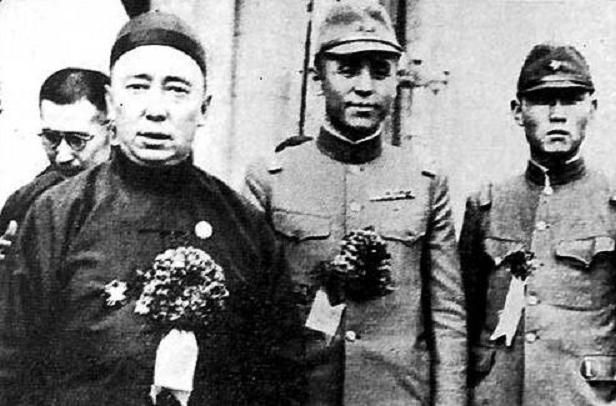
[size=-2]Prince Demchugdongrub (left, front) and his Japanese masters[/size]
I honestly don’t know why the Japanese waste their time with these kinds of political games. Nobody with half a brain is going to think anything but that the Japanese are really in charge, so pretending otherwise is just insulting. Their culture is extremely honor-bound, however, so perhaps they feel they will lose less face by telling a blatant lie than they would by giving the brutal truth.
20 October: Spent the day schmoozing with General Alexei Kolnigin and his staff at the city hall. He commands the infantry detachment that has been in the city for a short while now. The General has a fairly interesting history. He served in the Tsar’s army in the Far East and was living with his family in Port Arthur when the Japanese captured it during their 1905 war with Russia. His family was killed, but he was taken prisoner and later released. He remained in the army but fled to Harbin in Manchuria when the Reds took over. Later, he fled for a second time to China after the Japanese turned Manchuria into Manchukuo, finally finding a home with the Mas. He has a very fancy samovar that his staff brings with him into the field so he can always have his daily tea. I joked with him that Russians were only supposed to drink vodka. He said that was true, until he moved to Golmud and was forced to dry out as no vodka was there to be had. His staff all make for terrible bridge players, so it’s my turn to have somebody to victimize until Ma Bufang returns from his mission in the south. But I do have to be careful not to be lured into a chess game...
24 October: I caught my first sight of troops still loyal to Chiang today. They came up the main road to attack Chungking, but were repulsed fairly easily. I do have to give Kolnigin a great deal of credit. He may be old, but he knows his craft. Due to Chungking’s position in the hills, the only real practical axis of attack is the main road coming up from the east. However, the General has men patrolling up and down the Yangtze in small riverboats, plus there are small detachments on every hilltop around the city. Kolnigin doesn’t plan on being surprised by anything. His planning has paid off, as there was some gunfire exchanged last night between his hilltop pickets and some small enemy force that came down from the north. The suspicion is that they were merely attempting to gather intelligence on the defenses of the city. If so, they would have only learned that the General has all his bases covered, to borrow a baseball term.
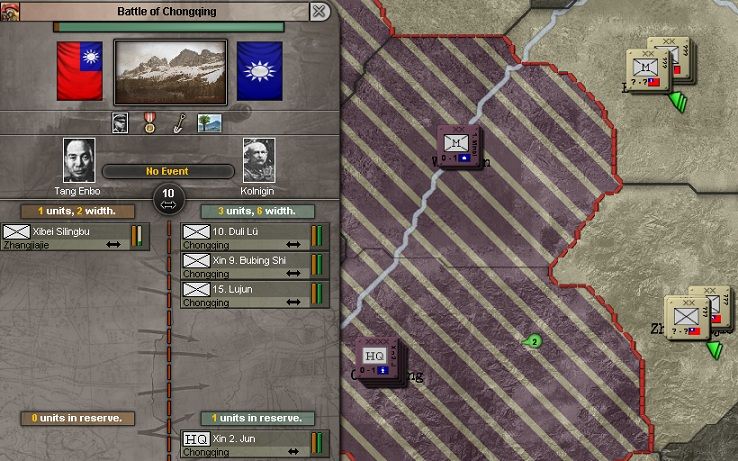
[size=-2]Chiang’s troops start a battle, if you can call it that[/size]
The attack came up this morning via the main road and consisted of two infantry brigades. General Kolnigin has six brigades in total at his immediate disposal, plus he can send to Ma Bufang in the south if a serious problem erupts. So Chiang’s troops had no chance really, but they attacked anyway. The attack consisted mainly of a mass charge up the steep grade of the road that was quickly beaten off with rifle fire and a small amount of artillery support. Neither force had anything more available aside from some small field pieces, but the enemy’s didn’t have the range to fire up into the hills. The charging troops quickly became disorganized and scattered and broke off the attack just a rapidly as it began. I watched the battle (such as it was) from the comfort of the General’s position near the rear and was able to get a few close-ups of the action thanks to my zoom lens. I was curious to ask the General why he thought that Chiang’s commander would order an attack that appeared to be so clearly hopeless.
`For them, it is nichevo, it can not be helped. Since we drove off their patrols last night, they may be gambling that we have fewer troops here than we do. And Chungking is the key city of the southwest... we cannot be allowed to keep it, or Chiang’s position will be gravely weakened. His best option will be to start a massive artillery bombardment or aerial attack that will keep us pinned down long enough to buy his men time to advance up the hills. Or, he could try an encirclement to starve us out. But the terrain around the city will make it difficult to completely seal us off, and he would also have to blockade the Yangtze somehow. This would all take many more men than I see here at present. If they wish to properly reduce Chungking, they need far more troops and the time to employ them properly, neither of which they have, if they don’t want to further erode the front against the Japanese in the northeast. Our enemy is in a desperate position, and will make many mistakes. I am sure they will feel compelled to attack us again, but for now it is dos vedanya! `
I should point out that aside from the odd Russian word that he dropped in, all my conversations with the General took place in Mandarin. And after the enemy had pulled out, he showed me a map that had markings of troop positions all the way back towards Golmud.
`Here in the west of China there are many such places that are as easy to defend as this city. Our men are now already in place and were dug in long before Chiang was able to pull his own divisions off the line with the Japanese. It will be impossible for Chiang to launch a massive attack all along our front here. At best, he can try to make a local concentration of force somewhere that will break though our lines and allow him access to the empty terrain behind...` here, he made a sweeping gesture with his hand across the western half of the map. `As you can see, we have no strategic reserve available if there is a breakthrough, but this is nichevo again. There are enough divisions ready that we can secure the route down to Chungking and a little beyond, but no more. If Chiang looks to be reshuffling his men to get local superiority anywhere, at best we can reposition our own lines to respond. But the strategy of Ma Hongkui is sound. It requires far less to hold than it does to take. `
`Doesn’t that mean that now that these lines are established, the Mas won’t be able to advance either? ` I felt obligated to point this out.
`Da, da, but this is more nichevo. Our positions here give us the best areas of the west. Simply holding it is enough, as Chiang will not be able to carry on alone against the Japanese without it- too much of his industrial power has been built up here. Ma Hongkui is convinced Chiang will see the futility of continued resistance and agree to place the Mas in charge. `
Something was still bothering me about this scheme, but it took me a while to place my finger on it. `What about the Generalissimos in Yunnan and Canton? If they throw in fully with Chiang, then this plan all comes crashing down, right? `
This got me a big booming laugh. `Excellent! You are good at finding all the nichevo in life, da? We will make a proper Russian of you yet. It is true that this is a worry, but not a worry for simple generals like me. We shall have to hope that Ma Hongbin does what he promised and keeps them sitting on their hands as long as possible. Come, let us celebrate the day’s events. We only have tea and not proper vodka, but you know the answer to that already I suspect. `
`Nichevo? `
Naturally this triggered another laugh.
27 October: I found out that Ma Hongbin tried to negotiate Chiang’s capitulation today, but he refused to cede power to the Mas. It’s not clear to me how he could hope to quash this rebellion in the west and hold off the Japanese, but he either has some plan or will insist on fighting out of spite. There is also going to be a big meeting tomorrow of all the big-wigs from Szechuan province, of which Chungking is a part (the capital being Chengdu, a little father west of us). Most of the warlords in Szechuan are known to be staunch Chiang allies, such as Liu Xiang. We certainly caught a major break, as Liu Xiang normally uses Chungking as his base of operations, but his troops were all out to the northeast supporting Chiang. All that remain in the area are lesser warlords, like Xiang’s deposed uncle Liu Wenhui. These types of men are fairly easy to recruit since they have a strong sense of vengeance to repay any real or imagined slights from the hand of Liu Xiang or Chiang Kai-shek. Szechuan is fairly famous for its cuisine, maybe they will have Kung Pao chicken served during the meeting... ha!
1 November: Odd news from the front. Word came from Golmud that Ma Bufang has been accused of having improper relations with the wife of one of the other officers on the General Staff, back before all hell broke loose in July[size=-2][3][/size]. Nobody takes these allegations seriously and it would appear to be a power play by one of the lower-ranking commanders, but just to show that he doesn’t tolerate such impropriety, Ma Hongkui has officially relieved Bufang from his post as Head of the Navy. Of course, this is even less than a slap on the wrist as there were no major duties assigned to that posting anyway.
4 November: Another probing attack today from Chiang’s men, making this the second in as many weeks. By the time the news of these battles trickles back up to the city and I can hop out of bed, it’s already over and the enemy is in retreat. These battles are so short they don’t even really qualify as an annoyance.
7 November: Chungking attacked again today; no other battles were reported along the front. General Kolnigin seems to be correct, both sides appear to have found a defensive line where no side will get advantage over the other, but the Japanese are continuing to advance slowly from the northeast. Chiang is basically playing a game of chicken on who will cave in and unify China against Japan, but since Hongkui has the fastnesses of western China to fall back on, you can be sure it won’t be him.
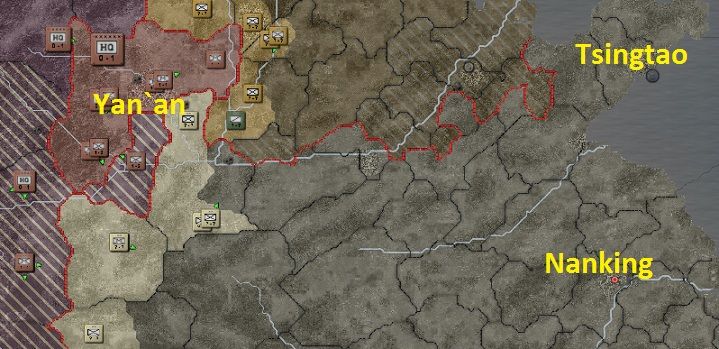
[size=-2]Japan is still slowly on the advance[/size]
16 November: Another attack on Chungking, I didn’t even bother to try and leave the hotel for this one.
24 November: Yet another poorly conceived assault on Chungking, I’m starting to lose track of them all. Chiang is using more brigades than before, but there are still fewer men on the attack than we have here to defend.
11 December: The Mas have had their first setback today. Ma Bufang was back in Chungking to have a briefing with Alexei over the state of things in the southwest. They had finished their meeting and we were drinking tea and playing bridge. I had hoped I could partner up with Bufang, but I was placed with Alexei instead... well, that does him a bit of a disservice, since his game has improved somewhat. Bufang was paired up with a Major on Alexei’s staff... Sharapov I think. Alexei gave a 2 club opening that I had planned to respond with 4 hearts, but a messenger interrupted us.
We found out that the cavalry unit that Bufang and I had ridden down with had been bombed repeatedly from the air and forced to retreat. Strategically, this retreat was unimportant, as the division was at the very tail end of the territory the Ma Clique was trying to guard, and the loss of the area didn’t open any holes in the lines. Of more significance was the realization that Chiang had no intention of giving up the reins of power and was positioning himself to strike back. We had known already that his troops were fighting both the Japanese and his fellow Chinese, and the Communists had been driven from Ankang a couple of days ago, but that area was in the theatre of operations of major combat. The bomber wing that attacked the cavalry is one of the old SB-2s that Chiang was given by the Soviet Union and represents the bulk of Chiang’s air power. Knowing that he felt it more vital to use that wing in the west instead of against the Japanese is a matter of no small consequence. Bufang was forced to leave to try and wire Golmud for consultations, so needless to say there were no further attempts at bridge that night.
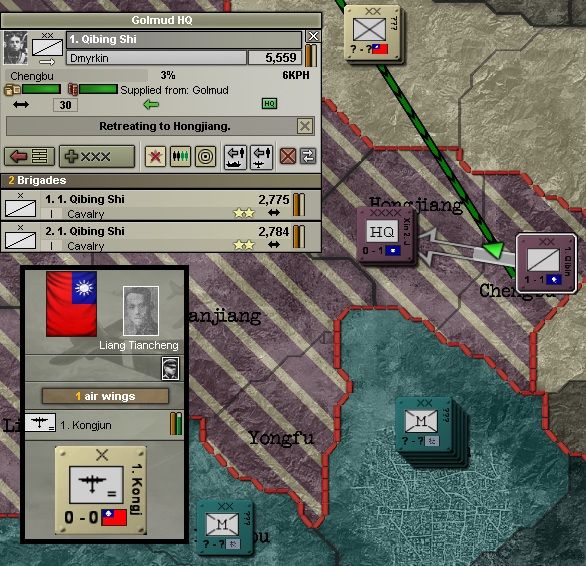
[size=-2]Relentless air attacks were required to rout Ma forces[/size]
14 December: Alexei dispatched General Mirkin, another of his White Russian compatriots, to launch a counterattack out of Chungking. Chiang’s aggressiveness has caused Ma Buqing to respond in kind by ordering a general push along the front, but Chungking is just as hard to attack *from* as it is to attack into. I watched the attack from relative safety for a few hours, but it had to be quickly called off. The roads out of the city are just too easy to blockade.
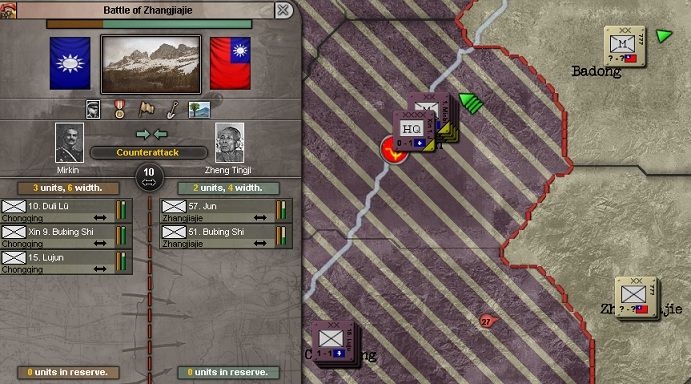
[size=-2]The Ma Clique launches attacks to varying degrees of success[/size]
31 December: I sent some wires back to Golmud to find out how things were going for the old gang there. Konrad tells me that Jie has sunk into melancholia since I’ve left. Perhaps I should get back soon. And the last few months have been pretty hard for Konrad... which in turn means things are hard for his regulars, too. As expected, the minute trouble broke out with Japan, the flow of Tsingtao beer dried up. Since this was Konrad’s major source of booze (Golmud is a teetotaler Muslim society, remember), he hasn’t been able to get anything in to replace it yet. Peter did manage to get a small flow of non-alcoholic drinks running up through Hanoi and Yunnan, but this is barely enough to keep his regulars’ tongues wet. He’s mainly be keeping the business going by showing movies, but the supply of new ones is also not the greatest. Even the most die-hard Marx Brothers fan can only watch A Day at the Races so many times! He did manage to get a very special treat, however, that should help keep him solvent over the next few weeks. The Walt Disney Co. back in the States has released a feature-length cartoon to be shown in theatres. This is the same company that produces the short films with the mouse character that I’ve seen a few times out here, as they are sometimes included with other movies. These cartoons have gone over well back in Golmud, as they don’t rely on dialogue to be amusing, so they are easy to understand. I don’t follow cartoons much myself (I prefer the newsreels) but I think the duck character is also pretty popular. Every time he goes into one of his tantrums it gets a pretty big laugh at The Americaine.
Disney is going out on a limb by gambling that the public will wish to see a feature-length cartoon[size=-2][4][/size]. I would expect that it is children who would really want to view this movie, but since the parents are the ones who have to pay for the tickets, he has to craft a film that can be enjoyed by both young and old alike. The story is based on The Brothers Grimm’s Snow White, so he’s already played it safe by picking a topic that will be familiar to most of the audience. I’m fairly certain I wouldn’t pay twenty-five cents to see a duck have a fit for an hour! Hmmm... of course, it only takes a couple of minutes to tell the story of Snow White, so they must be doing something to pad the story out to feature-length. Well, if I ever get back to Golmud in the next couple of months, Konrad will probably still have the reels and I can find out. In the meantime I’m off to the city hall to celebrate the New Year with the troops there.
---
[size=-2]Editor’s Notes:
1. Conquered approximately 316 BC
2. Much of Inner Mongolia (the current nation of Mongolia informally being `Outer` Mongolia) was taken by the Manchus right before their conquest of the Ming dynasty in the 17th century, and the Manchus greatly encouraged Han Chinese settlement of the region. Speaking roughly, the eastern 1/3 of Inner Mongolia made up the western half of Manchukuo
3. When interviewed later, Theriaux would say `At the time I wrote that, I had no idea how much worse things could get. `
4. The film was produced with great difficulty and was known in Hollywood as ‘Disney’s Folly’. The estimated production cost was a quarter million; the final cost was nearly one-and-a-half million. However the success of the film won Disney an honorary Oscar and turned out enough profit for the studio to build a $4.5 million facility in Burbank, California, where they are still located in 2012[/size]
[post=13406583]Forward to next Update[/post]
[post=13318338]Back to previous Update[/post]
1937, Fall - Nichevo
[/size]
[size=-2]December issue discussing Japanese aggression[/size]
1 October: Ma Bufang’s cavalry and I reached Chungking today. They are going to continue on to the south, but I will stay here for a while. His main role is to basically show the flag and secure the governmental and communication centers all the way down to Canton, but not to do any real fighting. Infantry is already on a train down here and will hold the line in case of a counterattack. But Bufang is pressed for time and will not even wait for them to arrive before continuing south. He will leave tomorrow and I will be here alone for a spell with just the few dozen soldiers that are left stationed at the city hall. It will be a potentially dangerous time, but there is no immediate sign of a response from Chiang anywhere on the horizon. I’ll be very sorry to see Bufang go; he and some of the other members of his staff turned out to be quite formidable bridge players... I consider myself lucky there was never any money going on the table.

[size=-2]Ma Clique troops reach Chungking,
the most important city in the southwest[/size]
Chungking is one of China’s oldest cities, and given how long Chinese civilization has been continuously extant, that says quite a bit. The city sits on the Yangtze River, which has its own origins high up in the Tibetan plateau, and was at the very edge of Chinese influence to the west for much of antiquity. It was mainly independent until conquered by the state of Qin at about the time that Alexander the Great was building his empire in the Middle East[size=-2][1][/size]. Qin would end up being the first imperial dynasty to unify all of China and is also the source of the country’s name in English (Qin > Chin > China). Of course, the area occupied by Qin is far less than the lands claimed by China today, so I’m not quite clear as to what Chinese historians consider `all` of China when they refer to the Qin Empire. I assume they may mean being masters of both the Yellow River waterway in the north and the Yangtze River in the south... the Qin dynasty is predated by both the Shang dynasty and the even earlier Xia dynasty (so early it is ahead of the written record), but these kingdoms only flourished along the Yellow River I believe.

[size=-2]Peasants climb the streets of Chungking[/size]
This city is right up in the hills with a mountain range to be found at all of the cardinal directions. Although I haven’t been there myself, I would suspect that Chungking is even hillier than San Francisco. There are almost no motorcars anywhere to be seen, and many of the streets are actually just staircases, which mean this city has fewer bicycles than any other major urban area I’ve been to in China. Little plumbing is in existence, so most of the peasants have to keep hauling water up from the river and up the hills to the central part of the town. The river of course is also used as a sewer, so in between that and the pigs that are allowed to run free in the streets, it’s best to stay indoors when the heat of the day amplifies all the various smells. This city is also one of the foggiest I’ve ever been in, which draws another comparison to San Francisco. One of the locals told me it isn’t uncommon to have a whole month go by where there is fog every day. But getting back to the Yangtze, it is actually navigable all the way down to the coast from here, so if Shanghai at the river’s mouth can be kept out of Japanese hands, supplying the city directly should be a possibility in the long-term.

[size=-2]Peasants collect water from the Yangtze River.
I’ll take mine well-boiled, please![/size]
3 October: I’ve been spending my days at the city hall and my nights at a cheap flophouse nearby that Bufang’s men confiscated for a barracks. I feel fairly bad for the owners, and if I can work up the nerve I may try to speak to one of the Mas about getting them compensated. Most of my spare time consists of staying near the wireless to get news of what is happening. Once in a while we find that we can even get BBC broadcasts out of Hong Kong! Anyway, today there were definitely ‘news-worthy’ reports coming from the wireless. Japan finally took Peking, which made the military governor of Shaanxi province decide to surrender all forces under his control to the Japanese. So the Mas’ betrayal has certainly had an impact. Chiang has now sent enough men back by train to the west that his forward campaign in Manchuria has not only been beaten back, but the Japanese have pushed forward onto Han Chinese soil. So far there is still no sign of Chiang’s troops opposing the Ma Clique’s moves, but these areas are very far away from the Japanese front, and Chiang also now has a renewed war with the Communists to deal with over near Yan`an.

[size=-2]Peking has fallen; Chiang’s troops are now divided between
facing Japan, the Communists, and the Mas[/size]
It would also appear that the Japanese are wasting little time on the political front. They’ve announced that part of the areas of Shaanxi province they have occupied are being granted to the new state of Mengkukuo, which they have just `liberated` from the Han Chinese. This region was in fact carved off of Mongolia a long time ago, but it was so far back that the Mongols are now a minority in the region[size=-2][2][/size]. The Japanese did manage to find Mongolian royalty hidden in the population; Mongol prince Demchugdongrub is now the putative ruler of Mengkukuo. I honestly wish him well... he can’t really expect to be treated well by the Japanese, and if he ever falls into Chinese hands, things will be even worse for him. The best he can hope for is to avoid offending his new overlords and hope he doesn’t get assassinated.

[size=-2]Prince Demchugdongrub (left, front) and his Japanese masters[/size]
I honestly don’t know why the Japanese waste their time with these kinds of political games. Nobody with half a brain is going to think anything but that the Japanese are really in charge, so pretending otherwise is just insulting. Their culture is extremely honor-bound, however, so perhaps they feel they will lose less face by telling a blatant lie than they would by giving the brutal truth.
20 October: Spent the day schmoozing with General Alexei Kolnigin and his staff at the city hall. He commands the infantry detachment that has been in the city for a short while now. The General has a fairly interesting history. He served in the Tsar’s army in the Far East and was living with his family in Port Arthur when the Japanese captured it during their 1905 war with Russia. His family was killed, but he was taken prisoner and later released. He remained in the army but fled to Harbin in Manchuria when the Reds took over. Later, he fled for a second time to China after the Japanese turned Manchuria into Manchukuo, finally finding a home with the Mas. He has a very fancy samovar that his staff brings with him into the field so he can always have his daily tea. I joked with him that Russians were only supposed to drink vodka. He said that was true, until he moved to Golmud and was forced to dry out as no vodka was there to be had. His staff all make for terrible bridge players, so it’s my turn to have somebody to victimize until Ma Bufang returns from his mission in the south. But I do have to be careful not to be lured into a chess game...
24 October: I caught my first sight of troops still loyal to Chiang today. They came up the main road to attack Chungking, but were repulsed fairly easily. I do have to give Kolnigin a great deal of credit. He may be old, but he knows his craft. Due to Chungking’s position in the hills, the only real practical axis of attack is the main road coming up from the east. However, the General has men patrolling up and down the Yangtze in small riverboats, plus there are small detachments on every hilltop around the city. Kolnigin doesn’t plan on being surprised by anything. His planning has paid off, as there was some gunfire exchanged last night between his hilltop pickets and some small enemy force that came down from the north. The suspicion is that they were merely attempting to gather intelligence on the defenses of the city. If so, they would have only learned that the General has all his bases covered, to borrow a baseball term.

[size=-2]Chiang’s troops start a battle, if you can call it that[/size]
The attack came up this morning via the main road and consisted of two infantry brigades. General Kolnigin has six brigades in total at his immediate disposal, plus he can send to Ma Bufang in the south if a serious problem erupts. So Chiang’s troops had no chance really, but they attacked anyway. The attack consisted mainly of a mass charge up the steep grade of the road that was quickly beaten off with rifle fire and a small amount of artillery support. Neither force had anything more available aside from some small field pieces, but the enemy’s didn’t have the range to fire up into the hills. The charging troops quickly became disorganized and scattered and broke off the attack just a rapidly as it began. I watched the battle (such as it was) from the comfort of the General’s position near the rear and was able to get a few close-ups of the action thanks to my zoom lens. I was curious to ask the General why he thought that Chiang’s commander would order an attack that appeared to be so clearly hopeless.
`For them, it is nichevo, it can not be helped. Since we drove off their patrols last night, they may be gambling that we have fewer troops here than we do. And Chungking is the key city of the southwest... we cannot be allowed to keep it, or Chiang’s position will be gravely weakened. His best option will be to start a massive artillery bombardment or aerial attack that will keep us pinned down long enough to buy his men time to advance up the hills. Or, he could try an encirclement to starve us out. But the terrain around the city will make it difficult to completely seal us off, and he would also have to blockade the Yangtze somehow. This would all take many more men than I see here at present. If they wish to properly reduce Chungking, they need far more troops and the time to employ them properly, neither of which they have, if they don’t want to further erode the front against the Japanese in the northeast. Our enemy is in a desperate position, and will make many mistakes. I am sure they will feel compelled to attack us again, but for now it is dos vedanya! `
I should point out that aside from the odd Russian word that he dropped in, all my conversations with the General took place in Mandarin. And after the enemy had pulled out, he showed me a map that had markings of troop positions all the way back towards Golmud.
`Here in the west of China there are many such places that are as easy to defend as this city. Our men are now already in place and were dug in long before Chiang was able to pull his own divisions off the line with the Japanese. It will be impossible for Chiang to launch a massive attack all along our front here. At best, he can try to make a local concentration of force somewhere that will break though our lines and allow him access to the empty terrain behind...` here, he made a sweeping gesture with his hand across the western half of the map. `As you can see, we have no strategic reserve available if there is a breakthrough, but this is nichevo again. There are enough divisions ready that we can secure the route down to Chungking and a little beyond, but no more. If Chiang looks to be reshuffling his men to get local superiority anywhere, at best we can reposition our own lines to respond. But the strategy of Ma Hongkui is sound. It requires far less to hold than it does to take. `
`Doesn’t that mean that now that these lines are established, the Mas won’t be able to advance either? ` I felt obligated to point this out.
`Da, da, but this is more nichevo. Our positions here give us the best areas of the west. Simply holding it is enough, as Chiang will not be able to carry on alone against the Japanese without it- too much of his industrial power has been built up here. Ma Hongkui is convinced Chiang will see the futility of continued resistance and agree to place the Mas in charge. `
Something was still bothering me about this scheme, but it took me a while to place my finger on it. `What about the Generalissimos in Yunnan and Canton? If they throw in fully with Chiang, then this plan all comes crashing down, right? `
This got me a big booming laugh. `Excellent! You are good at finding all the nichevo in life, da? We will make a proper Russian of you yet. It is true that this is a worry, but not a worry for simple generals like me. We shall have to hope that Ma Hongbin does what he promised and keeps them sitting on their hands as long as possible. Come, let us celebrate the day’s events. We only have tea and not proper vodka, but you know the answer to that already I suspect. `
`Nichevo? `
Naturally this triggered another laugh.
27 October: I found out that Ma Hongbin tried to negotiate Chiang’s capitulation today, but he refused to cede power to the Mas. It’s not clear to me how he could hope to quash this rebellion in the west and hold off the Japanese, but he either has some plan or will insist on fighting out of spite. There is also going to be a big meeting tomorrow of all the big-wigs from Szechuan province, of which Chungking is a part (the capital being Chengdu, a little father west of us). Most of the warlords in Szechuan are known to be staunch Chiang allies, such as Liu Xiang. We certainly caught a major break, as Liu Xiang normally uses Chungking as his base of operations, but his troops were all out to the northeast supporting Chiang. All that remain in the area are lesser warlords, like Xiang’s deposed uncle Liu Wenhui. These types of men are fairly easy to recruit since they have a strong sense of vengeance to repay any real or imagined slights from the hand of Liu Xiang or Chiang Kai-shek. Szechuan is fairly famous for its cuisine, maybe they will have Kung Pao chicken served during the meeting... ha!
1 November: Odd news from the front. Word came from Golmud that Ma Bufang has been accused of having improper relations with the wife of one of the other officers on the General Staff, back before all hell broke loose in July[size=-2][3][/size]. Nobody takes these allegations seriously and it would appear to be a power play by one of the lower-ranking commanders, but just to show that he doesn’t tolerate such impropriety, Ma Hongkui has officially relieved Bufang from his post as Head of the Navy. Of course, this is even less than a slap on the wrist as there were no major duties assigned to that posting anyway.
4 November: Another probing attack today from Chiang’s men, making this the second in as many weeks. By the time the news of these battles trickles back up to the city and I can hop out of bed, it’s already over and the enemy is in retreat. These battles are so short they don’t even really qualify as an annoyance.
7 November: Chungking attacked again today; no other battles were reported along the front. General Kolnigin seems to be correct, both sides appear to have found a defensive line where no side will get advantage over the other, but the Japanese are continuing to advance slowly from the northeast. Chiang is basically playing a game of chicken on who will cave in and unify China against Japan, but since Hongkui has the fastnesses of western China to fall back on, you can be sure it won’t be him.

[size=-2]Japan is still slowly on the advance[/size]
16 November: Another attack on Chungking, I didn’t even bother to try and leave the hotel for this one.
24 November: Yet another poorly conceived assault on Chungking, I’m starting to lose track of them all. Chiang is using more brigades than before, but there are still fewer men on the attack than we have here to defend.
11 December: The Mas have had their first setback today. Ma Bufang was back in Chungking to have a briefing with Alexei over the state of things in the southwest. They had finished their meeting and we were drinking tea and playing bridge. I had hoped I could partner up with Bufang, but I was placed with Alexei instead... well, that does him a bit of a disservice, since his game has improved somewhat. Bufang was paired up with a Major on Alexei’s staff... Sharapov I think. Alexei gave a 2 club opening that I had planned to respond with 4 hearts, but a messenger interrupted us.
We found out that the cavalry unit that Bufang and I had ridden down with had been bombed repeatedly from the air and forced to retreat. Strategically, this retreat was unimportant, as the division was at the very tail end of the territory the Ma Clique was trying to guard, and the loss of the area didn’t open any holes in the lines. Of more significance was the realization that Chiang had no intention of giving up the reins of power and was positioning himself to strike back. We had known already that his troops were fighting both the Japanese and his fellow Chinese, and the Communists had been driven from Ankang a couple of days ago, but that area was in the theatre of operations of major combat. The bomber wing that attacked the cavalry is one of the old SB-2s that Chiang was given by the Soviet Union and represents the bulk of Chiang’s air power. Knowing that he felt it more vital to use that wing in the west instead of against the Japanese is a matter of no small consequence. Bufang was forced to leave to try and wire Golmud for consultations, so needless to say there were no further attempts at bridge that night.

[size=-2]Relentless air attacks were required to rout Ma forces[/size]
14 December: Alexei dispatched General Mirkin, another of his White Russian compatriots, to launch a counterattack out of Chungking. Chiang’s aggressiveness has caused Ma Buqing to respond in kind by ordering a general push along the front, but Chungking is just as hard to attack *from* as it is to attack into. I watched the attack from relative safety for a few hours, but it had to be quickly called off. The roads out of the city are just too easy to blockade.

[size=-2]The Ma Clique launches attacks to varying degrees of success[/size]
31 December: I sent some wires back to Golmud to find out how things were going for the old gang there. Konrad tells me that Jie has sunk into melancholia since I’ve left. Perhaps I should get back soon. And the last few months have been pretty hard for Konrad... which in turn means things are hard for his regulars, too. As expected, the minute trouble broke out with Japan, the flow of Tsingtao beer dried up. Since this was Konrad’s major source of booze (Golmud is a teetotaler Muslim society, remember), he hasn’t been able to get anything in to replace it yet. Peter did manage to get a small flow of non-alcoholic drinks running up through Hanoi and Yunnan, but this is barely enough to keep his regulars’ tongues wet. He’s mainly be keeping the business going by showing movies, but the supply of new ones is also not the greatest. Even the most die-hard Marx Brothers fan can only watch A Day at the Races so many times! He did manage to get a very special treat, however, that should help keep him solvent over the next few weeks. The Walt Disney Co. back in the States has released a feature-length cartoon to be shown in theatres. This is the same company that produces the short films with the mouse character that I’ve seen a few times out here, as they are sometimes included with other movies. These cartoons have gone over well back in Golmud, as they don’t rely on dialogue to be amusing, so they are easy to understand. I don’t follow cartoons much myself (I prefer the newsreels) but I think the duck character is also pretty popular. Every time he goes into one of his tantrums it gets a pretty big laugh at The Americaine.
Disney is going out on a limb by gambling that the public will wish to see a feature-length cartoon[size=-2][4][/size]. I would expect that it is children who would really want to view this movie, but since the parents are the ones who have to pay for the tickets, he has to craft a film that can be enjoyed by both young and old alike. The story is based on The Brothers Grimm’s Snow White, so he’s already played it safe by picking a topic that will be familiar to most of the audience. I’m fairly certain I wouldn’t pay twenty-five cents to see a duck have a fit for an hour! Hmmm... of course, it only takes a couple of minutes to tell the story of Snow White, so they must be doing something to pad the story out to feature-length. Well, if I ever get back to Golmud in the next couple of months, Konrad will probably still have the reels and I can find out. In the meantime I’m off to the city hall to celebrate the New Year with the troops there.
[video=youtube;0txTv40HZbk]http://www.youtube.com/watch?v=0txTv40HZbk [/video]
---
[size=-2]Editor’s Notes:
1. Conquered approximately 316 BC
2. Much of Inner Mongolia (the current nation of Mongolia informally being `Outer` Mongolia) was taken by the Manchus right before their conquest of the Ming dynasty in the 17th century, and the Manchus greatly encouraged Han Chinese settlement of the region. Speaking roughly, the eastern 1/3 of Inner Mongolia made up the western half of Manchukuo
3. When interviewed later, Theriaux would say `At the time I wrote that, I had no idea how much worse things could get. `
4. The film was produced with great difficulty and was known in Hollywood as ‘Disney’s Folly’. The estimated production cost was a quarter million; the final cost was nearly one-and-a-half million. However the success of the film won Disney an honorary Oscar and turned out enough profit for the studio to build a $4.5 million facility in Burbank, California, where they are still located in 2012[/size]
[post=13406583]Forward to next Update[/post]
[post=13318338]Back to previous Update[/post]
Last edited:
lots going on there ... so you turning on Chiang seems to be working - not least it looks like his position has badly fragmented, but I'd guess he can stalemate you from your final comments.
the background/atmosphere stuff remains riveting
the background/atmosphere stuff remains riveting
lots going on there ... so you turning on Chiang seems to be working - not least it looks like his position has badly fragmented, but I'd guess he can stalemate you from your final comments.
I have to me very careful how my men are positioned and need to take care I don't launch any attacks that won't be at overwhelming odds, since ORG can disappear like that *snaps fingers* if the combat odds are even slightly against you. If you let even a single division get itself low on ORG you leave yourself vulnerable to a counter-attack that will punch through the lines.
I currently have 10 INF, 2 CAV, and 2 MIL binary divisions that the Ma Clique starts with. One INF and one CAV division are guarding Golmud from the perfidious Tibetans, so if I guard my lines well, I can only allow myself to have a 6-province long front. If I place three divisions in key areas like Chungking, then I have some weaker points in my own lines and have to watch for enemy buildups there. Most of my HQs have the job of securing all the empty territory behind the lines, which can take a while, as it takes over a month just to walk into the larger regions like Minxian alone. When I do stage an attack, I usually have to try and hit an area from multiple sides to get good odds, then if I win, I have to be careful to prevent all my victorious troops from moving in and creating gaps in my lines.
The betrayal of Chiang usually runs through three phases - first, I rush in and grab all I can while looking for places I can use as strong-points. Then, enemy troops arrive and I have to focus on defense. Lastly, enemy troops get pulled off the line and sent back to the Japanese, which weakens the front enough to allow me to start moving forward. As most of China's high-value VPs are in the west, defeat for the RoC usually follows. Since I've started to make localized offensives, the Mas are reaching the final phase of victory.
...the background/atmosphere stuff remains riveting
Thanks!
[size=+1]
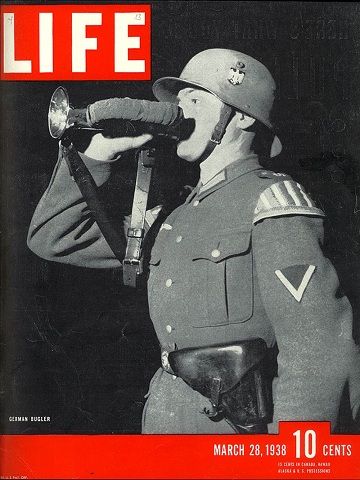
[size=-2]German bugler celebrates the Anschluss with Austria[/size]
1 January: The New Year brought a bunch of good news. The strain of facing too many enemies at once is starting to tell on Chiang’s forces. Fewer and fewer divisions are on the other side of the Ma Clique’s front, and things are going well enough in the north that the Communist exclave felt confident enough to send some divisions to the south to help reinforce Chungking. Alexei sent another force out to attack, which met with some success. Alexei’s ultimate goal is to reach Changde, the last major city in Szechuan, and the source of most of Chiang’s current air attacks against the Mas.
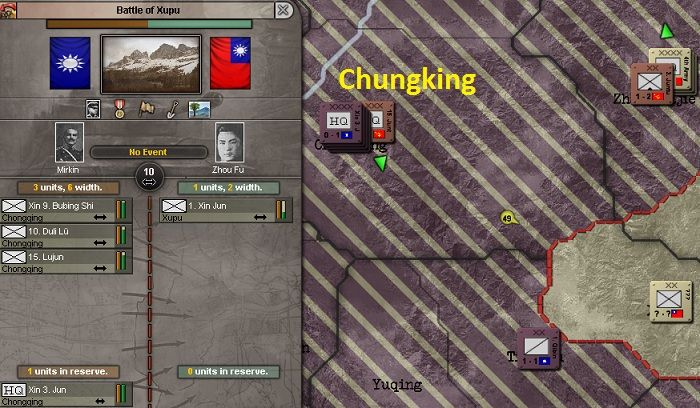
[size=-2]With greater security in the Chungking area, more attacks are ordered[/size]
The night before had been a grand old time... as well as any you might find in a speakeasy back in the States, even though booze was in short supply here. The staff of White Russians did Kozachok dances well into the night, despite the lack of vodka. A lot of Pjotr Leschenko records were also brought out to provide a suitable backdrop. I’d never heard of Leschenko before now. He is famous for doing gypsy music and Russian tango. Born in Bessarabia, he suddenly became a Romanian citizen after the Great War redrew the map of Europe. These days he is extremely popular with the Russian émigré population, and he is also enjoyed in the USSR as well, although his work is banned there and it has to be smuggled in. The one positive note on the lack of booze was that nobody was too hung over to co-ordinate the attacks the following day.
14 January: Ma Hongbin himself led an attack on Zhushan today. This region is famous for its horse-breeding, and its capture is the second highest priority of this war after holding the line to Chungking. Sadly a lot of the transportation in Ma territory still takes place on horseback, so the stocks of horseflesh there in Zhushan are badly needed. Ma troops are becoming scarce, so the attack isn’t taking place with overwhelming odds, but I’m told there are enough to do the job provided that the defenders aren’t reinforced. Since Chiang’s troops seem to be wearing thin, that possibility doesn’t seem likely.
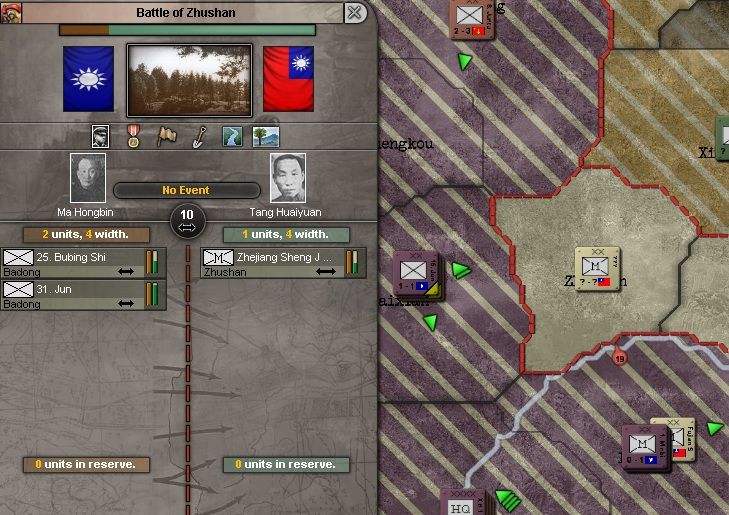
[size=-2]Zhushan is deemed worthy of a costly assault[/size]
16 January: We received word that a major worker strike has taken place in Golmud. Ma Bufang stopped by earlier to confer with Alexei and confessed that the supply situation in the capital is becoming dire. With Chiang an open enemy and Japan neutral-with-hostility, the Ma Clique no longer has any access to China’s major ports on the Yellow and Yangtze Rivers. Most international trade must now pass along the old Silk Road, the land route through Central Asia, but the major Western powers do not want to do business on this route. Ma Hongkui has negotiated trade deals with all of his immediate neighbors, but their economies are even weaker than his and have no surpluses of note that they can trade away. The biggest shortage is in steel, followed by coal, despite the Herculean efforts of guys like Paddy and Crosetti to improve production. Things are apparently so dire that in less than two months Golmud’s industries could run out completely of all the raw materials they need to keep going. The civilian economy is already suffering; the army will be suffering next. I have great sympathy for the striking workers, but Ma Hongkui is really over a barrel. There is no way for him to improve conditions back in Golmud without winning this war quickly. On the plus side, this is at least good for Konrad, since the workers now have little better to do than spend their time at places like The Americaine. Of course, their money will only last so long while they are on strike...
22 January: Japanese forces are reaching for Nanking. By now they’ve flowed past the Communist holdings in the north, which brings security to Yan`an. This should allow them to divert more of their troops from garrison duties to reinforce Ma positions farther south. Ma Hongbin’s spies report a lot of confusion and indecision on Chiang’s staff. Troops are shipped from the west to defend the east, and then put back on the road nearly as soon as they arrive, and vice-versa. He is perhaps coalescing forces to safeguard Nanking, but that is unlikely to help him.
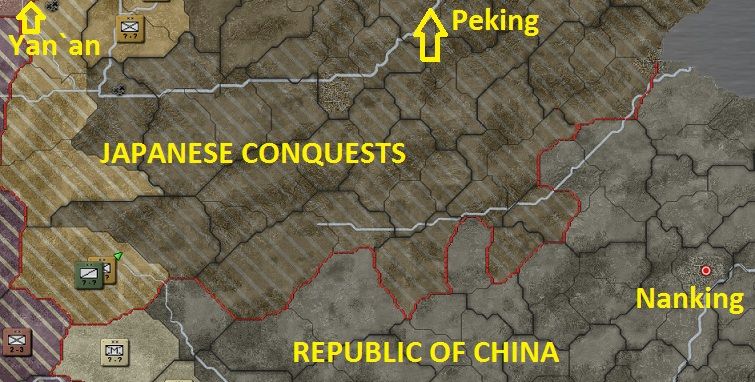
[size=-2]Japan advances down from the northeast while the Ma Clique holds in the west[/size]
31 January: Major defeat for the Ma Clique today. All the Mas- Hongkui, Hongbin, Bufang, and Buqing, have been in the Chungking area this past week to personally oversee what should be the final push to eliminate Chiang. It was decided to head for Changde so that all of Szechuan would be in the Mas’ hands. This province has traditionally been the Kuomintang’s staunchest supporter, and the troops that Chiang has under his control come from Szechuan in disproportionate numbers. It is hoped that by knocking out the last stronghold here, Chiang’s troops will be encouraged to desert him and return to defend their homes. Ma Hongkui is convinced that this will happen to the degree that a series of risky attacks has been launched to try and push on Changde before the Japanese can reach Nanking. Lower-ranking generals like Alexei have been recommending caution but are being overridden. While Hongkui’s offensive hasn’t been costly in terms of battlefield casualties, the Ma troops are constantly being ordered to advance in a disorganized state, which has been rendering them ineffective on the battlefield. Divisions arriving in the area are ordered to assault whether they are ready or not, as the idea is to keep up relentless pressure on the enemy. Supplies have also started to become an intermittent problem, as predicted in the aftermath of the strikes back in Golmud. Perhaps the `attack early, attack often` strategy would be more effective if the Mas’ divisions had heavy artillery support, but they do not. Artillery might disrupt the enemy enough to make the massed infantry charges more potent. Hongkui is getting so close to victory he can almost taste it, as the saying goes, so he is prepared to risk all and ignore the consequences to finish the job. But, `more haste, less speed`, as yet another saying runs.
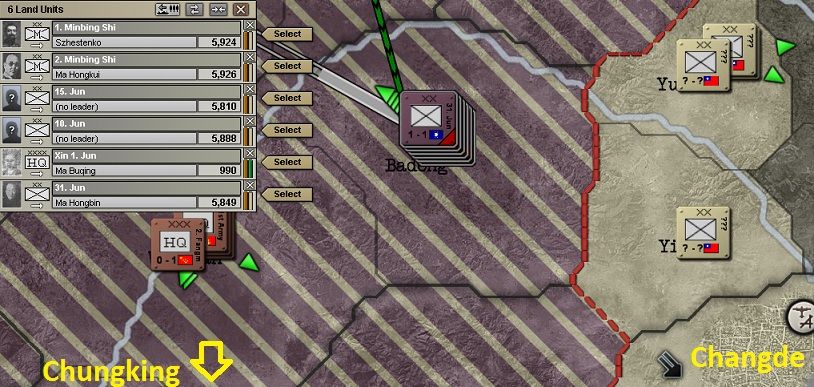
[size=-2]An infantry spearhead is successfully deflected from its path to Changde[/size]
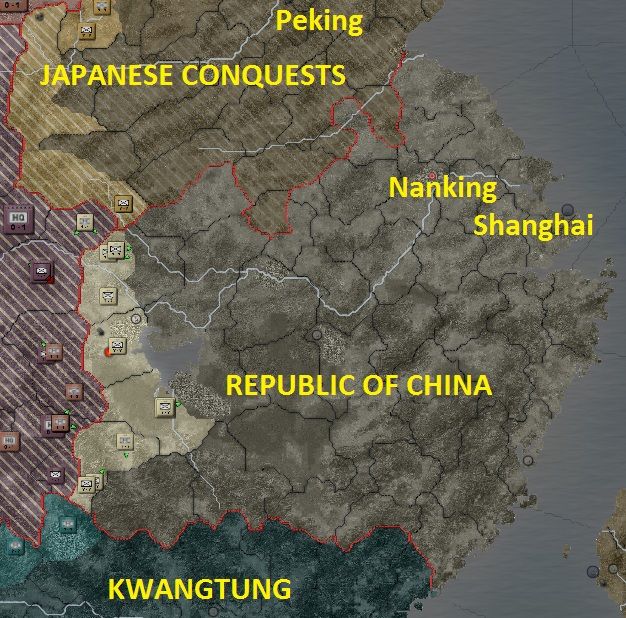
[size=-2]Ma Hongkui needs to get Changde before Japan gets Nanking[/size]
10 February: Communist divisions arriving in the north have allowed the Mas to collect up enough troops to try and hit Changde. The Mas themselves have left the field to meet in Chungking and try to plan out the post-war settlement with the other Kuomintang warlords, and as I understand it they have been incessant in their calls for Chiang to surrender. So many of his elite troops have been pulled off the line here in the west to engage the Japanese at Nanking that only policemen are left holding Changde. The Mas are sure to win, but having to fight in a major urban area will mean the policemen won’t be a pushover.
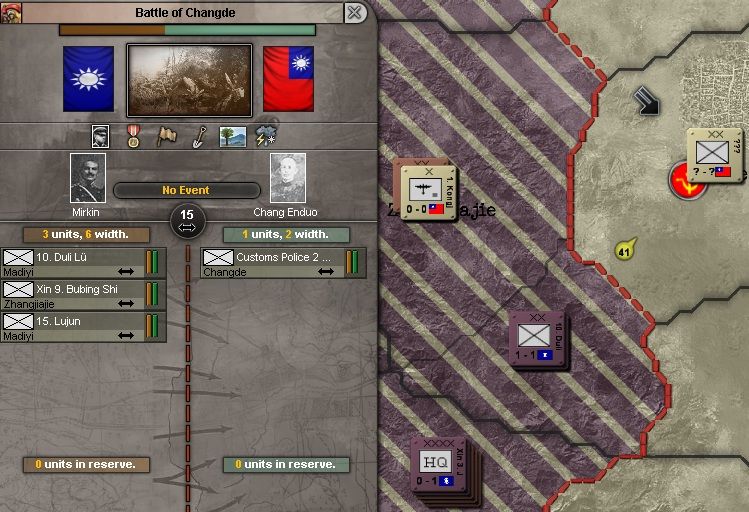
[size=-2]Customs police end up as Chiang’s soldiers of last resort[/size]
13 February: I heard from Alexei that a new brigade of Infantry has finished training up in Golmud, which will be the first military troops of any kind I’ve heard of the Mas producing to completion. If they can’t be shipped down here quickly, then they may be of little use as things could be over soon. Signs are strong that Changde will fall in the next few days.
14 February: I went down to the telegraph office to try and send a wire to Jie for St. Valentine’s Day and received a surprise of my own. All of the Mas were there in the office and had just received word that Chiang finally announced a surrender, but to the Japanese! I happened to walk in right as Ma Bufang was tossing the clerk’s table over on its side in a fit of anger, which was a very unusual sight. Alexei was also in the room and gave me a wink and a smile... I am sure he was thinking `nichevo` to himself.
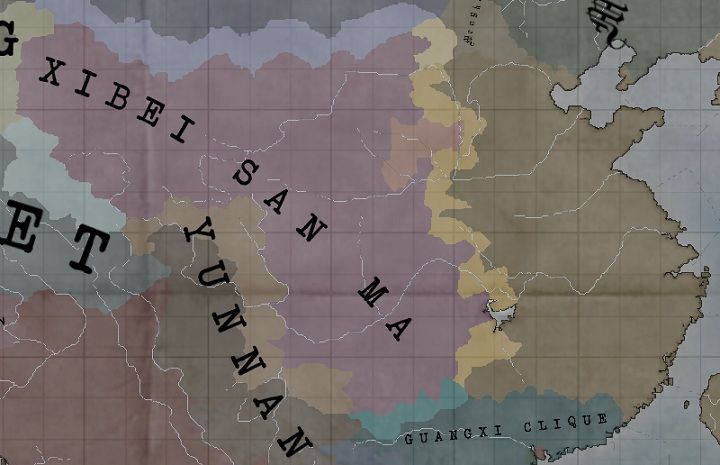
[size=-2]China splits in half in the aftermath of Chiang’s defeat[/size]
Later I was able to discover that Ma Hongkui’s stratagems worked, up to a point. Early in the morning their troops had finished routing out the customs police that were holding out in Changde. This did in fact cause Chiang to come to the bargaining table, but with the Japanese of all people. He seems to have reached a deal where he has some kind of position of authority in the new administration that the Japanese will set up over their occupied Chinese territories. We’ve heard he is already on a plane off to Taiwan. His number-two man, Wang Jingwei, has been spending most of the day making radio broadcasts from Nanking and calling for calm. I would suspect that Jingwei is setting himself up to join a growing chorus line of Japanese puppets, along with Emperor Puyi and Prince Demchugdongrub. Chiang himself will likely go down as a traitor, but that all depends on who writes those books, of course. I’m sure he worked himself a better deal than he would have at the hands of the Mas.
I have to pack my bags quickly after this, as the Mas are going to take a motorcar over to the Changde airfield and then fly back to Golmud immediately. I’m allowed to come along but I have very little time to waste, they won’t wait.
20 February: It feels nice to be at my old digs at the `Good Restings`, and it was very nice to be able to see Jie again. I’ve already had her over for dinner a few times here at the hotel, although her father and mother came along each time as chaperones. I thought this was a bit odd as she works in a public house, but I didn’t press them on it. I can always just catch her after-hours there if we ever really need any alone time.
I’ve been able to have a few sessions with the Mas this week to discuss with them what they may do now that so much of China ended up in Japan’s hands despite their best efforts. In particular I had lunch with Ma Hongkui and his staff out at a local restaurant instead of his usual area in the government buildings. The joint was named `Polo’s Place` and featured Italian food, trying to cater to Western styles. I’d already heard about this spot earlier; Crosetti said the food there was `garbage`, but let’s face it, no-one ever gives a restaurant the same ratings as they do food from the `old country`. Anyway, it can be amusing to watch the Chinese there eating their spaghetti & sauce with chopsticks. That also reminds me of an old saw: you can add cheese to Italian food, and it’s wonderful, but add cheese to Chinese food, and it’s terrible- despite the fact that both have noodle dishes.
One feature of note for this place is that they are experimenting with paper napkins, which still aren’t that common even in the West, despite their obvious and multiple advantages over dealing with the maintenance of cloth napkins. Ma Hongkui used one as he literally sketched out his thoughts on what needed to be done for the rest of the year. When I got back to my hotel tonight I realized I had idly picked it up.
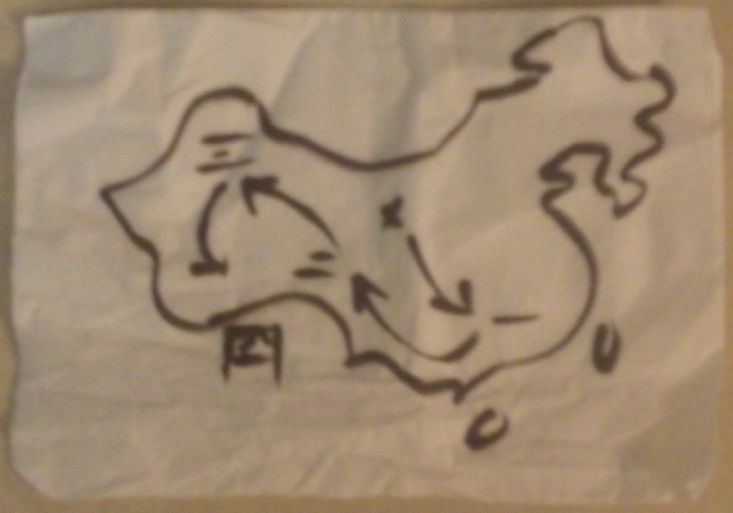
[size=-2]Ma Hongkui’s short-term plans for China (photo courtesy Theriaux family)[/size]
The biggest problem was still the lack of port facilities. Hongkui estimated that the acquisition of western China increased the industrial capability available to him by roughly 50%, but even before this, his industries were starving due to a lack of material, especially iron ore. But he stressed the issue wasn’t a shortage of funds or international good-will: `The supplies are there, but the merchants demand security. They will not sell unless we control the port. It is too high-risk for them to sell and have the goods or money intercepted by the Japanese, for example. So we must get a port. `
The Japanese have already been making trouble in this regard. As Chiang’s betrayal has left them in control of the mouths of both the Yellow and Yangtze Rivers, they have been able to get an informal embargo in place by slapping on high tariffs to any proposed trade deals, and creating lots of other administrative hassles that make doing any business with the Mas totally unprofitable. The land routes available to the west and south have been tapped out for all they are worth. Hongkui’s first goal then is to move against Kwangtung province where the Guangxi Clique is based. They broke away from the Kuomintang in the 1920s and fought a war with Chiang, but agreed to cease fighting and support him again after Japan occupied Manchuria. Based on the fact that the Guangxi Clique’s chief, Li Zongren, failed to support Chiang after the Mas made their bold move, you can see there was never any love lost between the two. However, Zongren is enjoying his full independence now that Chiang is gone and has no wish to unify Kwangtung with the Mas. That won’t go well for him since Kwangtung is the last remaining bit of coastline that the Mas have access to without challenging Japan directly- including the key port of Canton itself. Having Canton could simplify trade greatly for the Mas since it also gives them access to the nearby European enclaves of Hong Kong and Macao.
After this, the general idea is to remove the remaining Chinese warlords and unify as much of China as is still possible: Yunnan, Sinkiang, and finally dealing with Tibet, which still has its army camped out near Golmud. With that done Hongkui hopes to be in a much more favorable position to deal with Japan, but only time will tell. He expressed interest in British India and French Indochina as well, so who knows what mad schemes might be brewing back there behind his smiling Buddha persona.
12 March: Sent a wire to my father to give him birthday wishes, and then went down to The Americaine to discuss the latest gossip about Germany. Two days ago a formal union was announced between Germany and Austria, which puts to bed an open question that has caused problems (and more than one war) in Europe for nearly 125 years.
You can almost blame this on the United States, if you like. The republican ideals spawned by their war of independence in 1775 went back to France with such personages as the Marquis de Lafayette. These ideals helped spawn the French Revolution of 1789, and although they were reigned in a bit when Napoleon declared himself Emperor, the notion of `liberté, égalité, fraternité ` was spread across the Continent. Napoleon replaced the aging Holy Roman Empire with the Confederation of the Rhine, but that political entity disappeared along with the French Empire. The Great Powers that wrote the treaties of 1815 were interested in keeping the German peoples divided. The power of nationalism exported by French arms could never be suppressed completely, so it was just a question of which of the two major German states, Prussia or Austria, would be the one to forge a complete Germany from the disparate pieces.
Getting Germany united under the Prussian banner was of course the great work of the famous Iron Chancellor, Bismarck. The man was undeniably brilliant, but Prussia had a few advantages that make a scenario of Austrian ascendancy unlikely. For one, the majority of north German peoples are Protestant, and famously so- this is the birthplace of Martin Luther, after all. Meanwhile the Austrians are Catholic. Bismarck’s machinations forged a second powerful state in Central Europe. Given how powerful Bismarck’s Germany was on its own, it seems highly unlikely that the other Great Powers would have tolerated this being combined with the Austro-Hungarian Empire into an even more powerful nation. You might also envisage the north Germans being suspicious that they would be less pre-eminent in a society that places them on a par with the Magyars and Slavs.
Even so, with how things worked out, there was still some sentiment to somehow unite the north and south Germans, which came to a head after the end of the Great War when the Austro-Hungarian Empire was dismantled. Many Austrians would have preferred to unite with Germany rather than be reduced to a minor rump state, but the Treaties of Versailles and Saint-Germain expressly forbade this. But just as had happened 100 years before, nationalist sentiments could not be wiped away with a diplomat’s pen. Despite the treaty prohibitions, the constitutions of both the new Weimar Republic in Germany and the First Austrian Republic both called for political unification.
The two countries were continuing to grow closer together throughout the 1920s, until the rise of the National Socialists in the first part of the decade began to push them apart, due to the extremism of the NSDAP party. Austrian members of the party even tried to stage a coup in ‘34, which succeeded in assassinating Austrian Chancellor Dollfuss but doing little else. His successor, Kurt Schuschnigg, worked hard to suppress the party, but they still agitated for union and he started to also receive pressure from the new Chancellor himself. He met with the Chancellor last month and agreed to appoint Austrian NSDAP members to positions of authority in the government, including the foolish appointment of a NSDAP member for the Minister of Security. Two days ago Schuschnigg announced that there would be a vote in Austria over the question of unification, but yesterday the German government announced an ultimatum demanding immediate union. After finding out that France and Great Britain were not going to support Austria’s continued independence, Schuschnigg caved to German demands. As of today the two countries are now unified, but oddly enough the vote is still going forward. I find it hard to believe that if the answer is `no`, the Germans will turn around and go home.
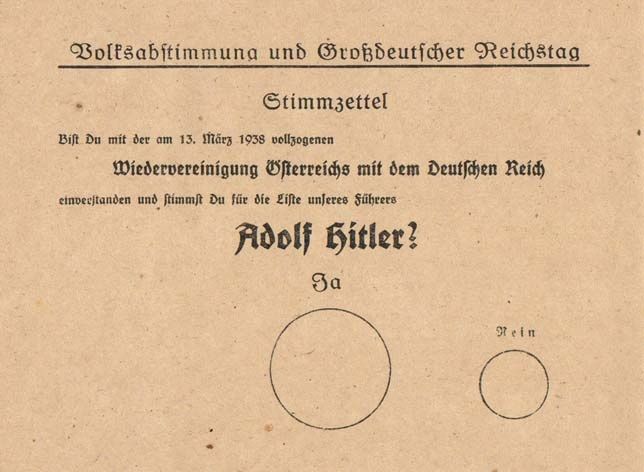
[size=-2]Difficult choices in the Anschluss vote[/size]
I asked Konrad how he felt about all this, and he raised an eyebrow and said `They’re Catholic`, which apparently settles the question for him.
15 March: I was having lunch with Ma Hongbin when one of his spies (I mean, `ambassadors`) came back with a filmstrip that was just released in Japan. When Chiang capitulated last month, the Japanese were essentially allowed to occupy Nanking as an open city. All Chinese troops still under Chiang’s control were ordered to hand over their weapons. For some reason, the forces that moved to take Nanking essentially started to loot the city and massacre the Chinese garrison that was trying to surrender. The Japanese alleged that some of these troops went to hide in the city’s refugee camps and they were forced to enter after them to root these `rogue` forces out, which contributed to massacres of the civilian population. Westerners were overseeing many of the refugee camps and Tokyo is stating that these foreign witnesses reported no inappropriate incidents, but this is clearly not the case.
The Manchester Guardian over in Great Britain has already filed some reports from Harold John Timperley, an Australian who has been reporting out of China since the early 1920s. I’ve met Harold a few times before I came out west, and I find him a credible fellow. In addition to independent statements from such as him, there is plenty of photographic evidence that *something* bad happened there. Future historians will only need to argue over a question of degree.
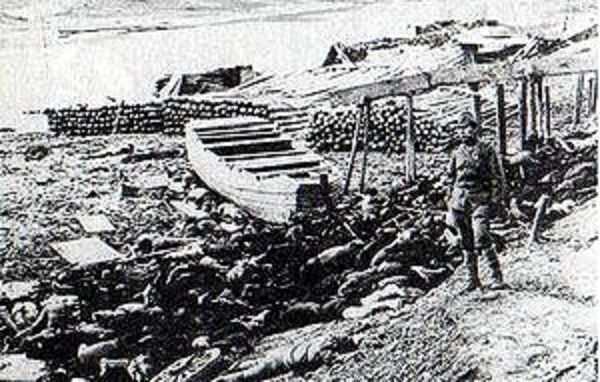
[size=-2]Plenty of troublesome images have come from Nanking[/size]
[video=youtube;wy9cC8ozj1g]http://www.youtube.com/watch?v=wy9cC8ozj1g[/video]
The filmstrip would have you believe the Chinese are thrilled that Japan has finally come to rule over them, which makes it fairly laughable if you’re not Japanese, but that’s propaganda for you. I guess it goes back to the whole issue of saving face... you just can’t admit any wrongdoing, no matter how blatant. Naturally all the Mas were highly upset when the first word of this came to Golmud last month, and you can be sure they have it logged on their tally sheet of grievances against the Empire of the Rising Sun.
[post=13479245]Forward to next Update[/post]
[post=13372254]Back to previous Update[/post]
1938, Winter - Die Zwie Anschluesse
[/size]
[size=-2]German bugler celebrates the Anschluss with Austria[/size]
1 January: The New Year brought a bunch of good news. The strain of facing too many enemies at once is starting to tell on Chiang’s forces. Fewer and fewer divisions are on the other side of the Ma Clique’s front, and things are going well enough in the north that the Communist exclave felt confident enough to send some divisions to the south to help reinforce Chungking. Alexei sent another force out to attack, which met with some success. Alexei’s ultimate goal is to reach Changde, the last major city in Szechuan, and the source of most of Chiang’s current air attacks against the Mas.

[size=-2]With greater security in the Chungking area, more attacks are ordered[/size]
The night before had been a grand old time... as well as any you might find in a speakeasy back in the States, even though booze was in short supply here. The staff of White Russians did Kozachok dances well into the night, despite the lack of vodka. A lot of Pjotr Leschenko records were also brought out to provide a suitable backdrop. I’d never heard of Leschenko before now. He is famous for doing gypsy music and Russian tango. Born in Bessarabia, he suddenly became a Romanian citizen after the Great War redrew the map of Europe. These days he is extremely popular with the Russian émigré population, and he is also enjoyed in the USSR as well, although his work is banned there and it has to be smuggled in. The one positive note on the lack of booze was that nobody was too hung over to co-ordinate the attacks the following day.
14 January: Ma Hongbin himself led an attack on Zhushan today. This region is famous for its horse-breeding, and its capture is the second highest priority of this war after holding the line to Chungking. Sadly a lot of the transportation in Ma territory still takes place on horseback, so the stocks of horseflesh there in Zhushan are badly needed. Ma troops are becoming scarce, so the attack isn’t taking place with overwhelming odds, but I’m told there are enough to do the job provided that the defenders aren’t reinforced. Since Chiang’s troops seem to be wearing thin, that possibility doesn’t seem likely.

[size=-2]Zhushan is deemed worthy of a costly assault[/size]
16 January: We received word that a major worker strike has taken place in Golmud. Ma Bufang stopped by earlier to confer with Alexei and confessed that the supply situation in the capital is becoming dire. With Chiang an open enemy and Japan neutral-with-hostility, the Ma Clique no longer has any access to China’s major ports on the Yellow and Yangtze Rivers. Most international trade must now pass along the old Silk Road, the land route through Central Asia, but the major Western powers do not want to do business on this route. Ma Hongkui has negotiated trade deals with all of his immediate neighbors, but their economies are even weaker than his and have no surpluses of note that they can trade away. The biggest shortage is in steel, followed by coal, despite the Herculean efforts of guys like Paddy and Crosetti to improve production. Things are apparently so dire that in less than two months Golmud’s industries could run out completely of all the raw materials they need to keep going. The civilian economy is already suffering; the army will be suffering next. I have great sympathy for the striking workers, but Ma Hongkui is really over a barrel. There is no way for him to improve conditions back in Golmud without winning this war quickly. On the plus side, this is at least good for Konrad, since the workers now have little better to do than spend their time at places like The Americaine. Of course, their money will only last so long while they are on strike...
22 January: Japanese forces are reaching for Nanking. By now they’ve flowed past the Communist holdings in the north, which brings security to Yan`an. This should allow them to divert more of their troops from garrison duties to reinforce Ma positions farther south. Ma Hongbin’s spies report a lot of confusion and indecision on Chiang’s staff. Troops are shipped from the west to defend the east, and then put back on the road nearly as soon as they arrive, and vice-versa. He is perhaps coalescing forces to safeguard Nanking, but that is unlikely to help him.

[size=-2]Japan advances down from the northeast while the Ma Clique holds in the west[/size]
31 January: Major defeat for the Ma Clique today. All the Mas- Hongkui, Hongbin, Bufang, and Buqing, have been in the Chungking area this past week to personally oversee what should be the final push to eliminate Chiang. It was decided to head for Changde so that all of Szechuan would be in the Mas’ hands. This province has traditionally been the Kuomintang’s staunchest supporter, and the troops that Chiang has under his control come from Szechuan in disproportionate numbers. It is hoped that by knocking out the last stronghold here, Chiang’s troops will be encouraged to desert him and return to defend their homes. Ma Hongkui is convinced that this will happen to the degree that a series of risky attacks has been launched to try and push on Changde before the Japanese can reach Nanking. Lower-ranking generals like Alexei have been recommending caution but are being overridden. While Hongkui’s offensive hasn’t been costly in terms of battlefield casualties, the Ma troops are constantly being ordered to advance in a disorganized state, which has been rendering them ineffective on the battlefield. Divisions arriving in the area are ordered to assault whether they are ready or not, as the idea is to keep up relentless pressure on the enemy. Supplies have also started to become an intermittent problem, as predicted in the aftermath of the strikes back in Golmud. Perhaps the `attack early, attack often` strategy would be more effective if the Mas’ divisions had heavy artillery support, but they do not. Artillery might disrupt the enemy enough to make the massed infantry charges more potent. Hongkui is getting so close to victory he can almost taste it, as the saying goes, so he is prepared to risk all and ignore the consequences to finish the job. But, `more haste, less speed`, as yet another saying runs.

[size=-2]An infantry spearhead is successfully deflected from its path to Changde[/size]

[size=-2]Ma Hongkui needs to get Changde before Japan gets Nanking[/size]
10 February: Communist divisions arriving in the north have allowed the Mas to collect up enough troops to try and hit Changde. The Mas themselves have left the field to meet in Chungking and try to plan out the post-war settlement with the other Kuomintang warlords, and as I understand it they have been incessant in their calls for Chiang to surrender. So many of his elite troops have been pulled off the line here in the west to engage the Japanese at Nanking that only policemen are left holding Changde. The Mas are sure to win, but having to fight in a major urban area will mean the policemen won’t be a pushover.

[size=-2]Customs police end up as Chiang’s soldiers of last resort[/size]
13 February: I heard from Alexei that a new brigade of Infantry has finished training up in Golmud, which will be the first military troops of any kind I’ve heard of the Mas producing to completion. If they can’t be shipped down here quickly, then they may be of little use as things could be over soon. Signs are strong that Changde will fall in the next few days.
14 February: I went down to the telegraph office to try and send a wire to Jie for St. Valentine’s Day and received a surprise of my own. All of the Mas were there in the office and had just received word that Chiang finally announced a surrender, but to the Japanese! I happened to walk in right as Ma Bufang was tossing the clerk’s table over on its side in a fit of anger, which was a very unusual sight. Alexei was also in the room and gave me a wink and a smile... I am sure he was thinking `nichevo` to himself.

[size=-2]China splits in half in the aftermath of Chiang’s defeat[/size]
Later I was able to discover that Ma Hongkui’s stratagems worked, up to a point. Early in the morning their troops had finished routing out the customs police that were holding out in Changde. This did in fact cause Chiang to come to the bargaining table, but with the Japanese of all people. He seems to have reached a deal where he has some kind of position of authority in the new administration that the Japanese will set up over their occupied Chinese territories. We’ve heard he is already on a plane off to Taiwan. His number-two man, Wang Jingwei, has been spending most of the day making radio broadcasts from Nanking and calling for calm. I would suspect that Jingwei is setting himself up to join a growing chorus line of Japanese puppets, along with Emperor Puyi and Prince Demchugdongrub. Chiang himself will likely go down as a traitor, but that all depends on who writes those books, of course. I’m sure he worked himself a better deal than he would have at the hands of the Mas.
I have to pack my bags quickly after this, as the Mas are going to take a motorcar over to the Changde airfield and then fly back to Golmud immediately. I’m allowed to come along but I have very little time to waste, they won’t wait.
20 February: It feels nice to be at my old digs at the `Good Restings`, and it was very nice to be able to see Jie again. I’ve already had her over for dinner a few times here at the hotel, although her father and mother came along each time as chaperones. I thought this was a bit odd as she works in a public house, but I didn’t press them on it. I can always just catch her after-hours there if we ever really need any alone time.
I’ve been able to have a few sessions with the Mas this week to discuss with them what they may do now that so much of China ended up in Japan’s hands despite their best efforts. In particular I had lunch with Ma Hongkui and his staff out at a local restaurant instead of his usual area in the government buildings. The joint was named `Polo’s Place` and featured Italian food, trying to cater to Western styles. I’d already heard about this spot earlier; Crosetti said the food there was `garbage`, but let’s face it, no-one ever gives a restaurant the same ratings as they do food from the `old country`. Anyway, it can be amusing to watch the Chinese there eating their spaghetti & sauce with chopsticks. That also reminds me of an old saw: you can add cheese to Italian food, and it’s wonderful, but add cheese to Chinese food, and it’s terrible- despite the fact that both have noodle dishes.
One feature of note for this place is that they are experimenting with paper napkins, which still aren’t that common even in the West, despite their obvious and multiple advantages over dealing with the maintenance of cloth napkins. Ma Hongkui used one as he literally sketched out his thoughts on what needed to be done for the rest of the year. When I got back to my hotel tonight I realized I had idly picked it up.

[size=-2]Ma Hongkui’s short-term plans for China (photo courtesy Theriaux family)[/size]
The biggest problem was still the lack of port facilities. Hongkui estimated that the acquisition of western China increased the industrial capability available to him by roughly 50%, but even before this, his industries were starving due to a lack of material, especially iron ore. But he stressed the issue wasn’t a shortage of funds or international good-will: `The supplies are there, but the merchants demand security. They will not sell unless we control the port. It is too high-risk for them to sell and have the goods or money intercepted by the Japanese, for example. So we must get a port. `
The Japanese have already been making trouble in this regard. As Chiang’s betrayal has left them in control of the mouths of both the Yellow and Yangtze Rivers, they have been able to get an informal embargo in place by slapping on high tariffs to any proposed trade deals, and creating lots of other administrative hassles that make doing any business with the Mas totally unprofitable. The land routes available to the west and south have been tapped out for all they are worth. Hongkui’s first goal then is to move against Kwangtung province where the Guangxi Clique is based. They broke away from the Kuomintang in the 1920s and fought a war with Chiang, but agreed to cease fighting and support him again after Japan occupied Manchuria. Based on the fact that the Guangxi Clique’s chief, Li Zongren, failed to support Chiang after the Mas made their bold move, you can see there was never any love lost between the two. However, Zongren is enjoying his full independence now that Chiang is gone and has no wish to unify Kwangtung with the Mas. That won’t go well for him since Kwangtung is the last remaining bit of coastline that the Mas have access to without challenging Japan directly- including the key port of Canton itself. Having Canton could simplify trade greatly for the Mas since it also gives them access to the nearby European enclaves of Hong Kong and Macao.
After this, the general idea is to remove the remaining Chinese warlords and unify as much of China as is still possible: Yunnan, Sinkiang, and finally dealing with Tibet, which still has its army camped out near Golmud. With that done Hongkui hopes to be in a much more favorable position to deal with Japan, but only time will tell. He expressed interest in British India and French Indochina as well, so who knows what mad schemes might be brewing back there behind his smiling Buddha persona.
12 March: Sent a wire to my father to give him birthday wishes, and then went down to The Americaine to discuss the latest gossip about Germany. Two days ago a formal union was announced between Germany and Austria, which puts to bed an open question that has caused problems (and more than one war) in Europe for nearly 125 years.
You can almost blame this on the United States, if you like. The republican ideals spawned by their war of independence in 1775 went back to France with such personages as the Marquis de Lafayette. These ideals helped spawn the French Revolution of 1789, and although they were reigned in a bit when Napoleon declared himself Emperor, the notion of `liberté, égalité, fraternité ` was spread across the Continent. Napoleon replaced the aging Holy Roman Empire with the Confederation of the Rhine, but that political entity disappeared along with the French Empire. The Great Powers that wrote the treaties of 1815 were interested in keeping the German peoples divided. The power of nationalism exported by French arms could never be suppressed completely, so it was just a question of which of the two major German states, Prussia or Austria, would be the one to forge a complete Germany from the disparate pieces.
Getting Germany united under the Prussian banner was of course the great work of the famous Iron Chancellor, Bismarck. The man was undeniably brilliant, but Prussia had a few advantages that make a scenario of Austrian ascendancy unlikely. For one, the majority of north German peoples are Protestant, and famously so- this is the birthplace of Martin Luther, after all. Meanwhile the Austrians are Catholic. Bismarck’s machinations forged a second powerful state in Central Europe. Given how powerful Bismarck’s Germany was on its own, it seems highly unlikely that the other Great Powers would have tolerated this being combined with the Austro-Hungarian Empire into an even more powerful nation. You might also envisage the north Germans being suspicious that they would be less pre-eminent in a society that places them on a par with the Magyars and Slavs.
Even so, with how things worked out, there was still some sentiment to somehow unite the north and south Germans, which came to a head after the end of the Great War when the Austro-Hungarian Empire was dismantled. Many Austrians would have preferred to unite with Germany rather than be reduced to a minor rump state, but the Treaties of Versailles and Saint-Germain expressly forbade this. But just as had happened 100 years before, nationalist sentiments could not be wiped away with a diplomat’s pen. Despite the treaty prohibitions, the constitutions of both the new Weimar Republic in Germany and the First Austrian Republic both called for political unification.
The two countries were continuing to grow closer together throughout the 1920s, until the rise of the National Socialists in the first part of the decade began to push them apart, due to the extremism of the NSDAP party. Austrian members of the party even tried to stage a coup in ‘34, which succeeded in assassinating Austrian Chancellor Dollfuss but doing little else. His successor, Kurt Schuschnigg, worked hard to suppress the party, but they still agitated for union and he started to also receive pressure from the new Chancellor himself. He met with the Chancellor last month and agreed to appoint Austrian NSDAP members to positions of authority in the government, including the foolish appointment of a NSDAP member for the Minister of Security. Two days ago Schuschnigg announced that there would be a vote in Austria over the question of unification, but yesterday the German government announced an ultimatum demanding immediate union. After finding out that France and Great Britain were not going to support Austria’s continued independence, Schuschnigg caved to German demands. As of today the two countries are now unified, but oddly enough the vote is still going forward. I find it hard to believe that if the answer is `no`, the Germans will turn around and go home.

[size=-2]Difficult choices in the Anschluss vote[/size]
I asked Konrad how he felt about all this, and he raised an eyebrow and said `They’re Catholic`, which apparently settles the question for him.
15 March: I was having lunch with Ma Hongbin when one of his spies (I mean, `ambassadors`) came back with a filmstrip that was just released in Japan. When Chiang capitulated last month, the Japanese were essentially allowed to occupy Nanking as an open city. All Chinese troops still under Chiang’s control were ordered to hand over their weapons. For some reason, the forces that moved to take Nanking essentially started to loot the city and massacre the Chinese garrison that was trying to surrender. The Japanese alleged that some of these troops went to hide in the city’s refugee camps and they were forced to enter after them to root these `rogue` forces out, which contributed to massacres of the civilian population. Westerners were overseeing many of the refugee camps and Tokyo is stating that these foreign witnesses reported no inappropriate incidents, but this is clearly not the case.
The Manchester Guardian over in Great Britain has already filed some reports from Harold John Timperley, an Australian who has been reporting out of China since the early 1920s. I’ve met Harold a few times before I came out west, and I find him a credible fellow. In addition to independent statements from such as him, there is plenty of photographic evidence that *something* bad happened there. Future historians will only need to argue over a question of degree.

[size=-2]Plenty of troublesome images have come from Nanking[/size]
[video=youtube;wy9cC8ozj1g]http://www.youtube.com/watch?v=wy9cC8ozj1g[/video]
The filmstrip would have you believe the Chinese are thrilled that Japan has finally come to rule over them, which makes it fairly laughable if you’re not Japanese, but that’s propaganda for you. I guess it goes back to the whole issue of saving face... you just can’t admit any wrongdoing, no matter how blatant. Naturally all the Mas were highly upset when the first word of this came to Golmud last month, and you can be sure they have it logged on their tally sheet of grievances against the Empire of the Rising Sun.
[post=13479245]Forward to next Update[/post]
[post=13372254]Back to previous Update[/post]
Last edited:
Nice work and I like your choice of videos. I just recommend appointing leaders to infantry not militia 
Nice work and I like your choice of videos...
Welcome, and thanks!
...I just recommend appointing leaders to infantry not militia
I do end up correcting that oversight. It's unfortunate that XSM doesn't even get enough leaders to fill out the divisions they start with. I basically have to keep shuffling the leaders around so that I have somebody there in any province about to have a fight, so there was a time when those Militia were in danger and I thought it might help to have a man at the helm, so to speak.
I should mention that at this stage, I was still operating under the erroneous assumption that conquest spoils are split based on who grabbed the most VPs, but as was pointed out in the main forums, it goes by province count. I might have been better served if I had split my Cavalry divisions into brigades and fanned out as much as possible to hit VPs before Japan moved past Shanxi, but of course the real Mas wouldn't know to do that.
frustrating to have the Japanese pilfer the spoils, but you've built a plausible narrative (& packing Chiang off to Taiwan is a stroke of genius). So Guanxi next, then a tour around the Chinese hinterlands?
Good show in the last two updates. I read Ma Hongkui's lamentations about lacking resources and access to a port, and before I finished the sentence I thought: "Hello Guanxi,are you ready for a visit by the Mas?" 
Going by the paper napkin masterplan, we're talking Guanxi first, then finally the Tibetans? And then, at long last, the Japanese? Will the Japanese sit by idly?
Never saw an actual copy of the post-Anschluss referendum form. It's almost breath-taking in its unsubtlety (almost - knowing what Adolf and company got up to in later years makes the Austrian episode look very tame by comparison).
Going by the paper napkin masterplan, we're talking Guanxi first, then finally the Tibetans? And then, at long last, the Japanese? Will the Japanese sit by idly?
Never saw an actual copy of the post-Anschluss referendum form. It's almost breath-taking in its unsubtlety (almost - knowing what Adolf and company got up to in later years makes the Austrian episode look very tame by comparison).
Interesting AAR, I like the narrative style you are using reminiscent of the Rank & File AAR and the fact that you are using Xibi San Ma. Did not know there were many Chinese Muslims or that they were significant warlords, I guess its just one of those things you never hear about in the west. Hopefully the Ma's end up more successful in this timeline than OTL.
Ma Bufang ended up running away to Saudi Arabia and Egypt with his family, Hongbin defected to the communists, Honguki ended up in the USA as a horse breeder after being exiled from Taiwan by the KMT for "frustrating the fulfillment of the military plan" , Buqing pretty much ended up in Taiwan with the KMT.
Also of note Wikipedia had a couple amusing quips on Honguki and why he was well fat... and that he hated communists
General Ma Hongkui suffered from severe Diabetes attacks, and in 1949 it was so bad he was not expected to recover. Despite his diabetes, he was addicted to ice cream and ate it constantly.
Ma Hongkui, like the President of China, Chiang Kaishek, was virurently anti communist. Whenever communists turned up in his territory they invariably ended up dead
Ma Bufang ended up running away to Saudi Arabia and Egypt with his family, Hongbin defected to the communists, Honguki ended up in the USA as a horse breeder after being exiled from Taiwan by the KMT for "frustrating the fulfillment of the military plan" , Buqing pretty much ended up in Taiwan with the KMT.
Also of note Wikipedia had a couple amusing quips on Honguki and why he was well fat... and that he hated communists
General Ma Hongkui suffered from severe Diabetes attacks, and in 1949 it was so bad he was not expected to recover. Despite his diabetes, he was addicted to ice cream and ate it constantly.
Ma Hongkui, like the President of China, Chiang Kaishek, was virurently anti communist. Whenever communists turned up in his territory they invariably ended up dead

